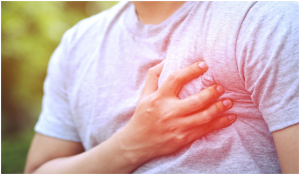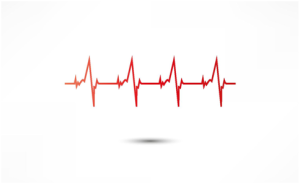Online CPR Certification Blog
Causes of Heart Palpitations: What Triggers Palpitations?
Date: May 5th, 2022
Causes of Heart Palpitations
The heart is part of the human circulatory system. It has four chambers and is located on the left side of the chest. The heart’s job is to transport deoxygenated blood from the body through the lungs and then oxygenate it before returning it to the rest of the body.
But sometimes, palpitations happen, leading to irregular heartbeats. So what are some common causes of heart palpitations?
What Are Palpitations?
Palpitations, aka heart flutters or heart skips, are feelings of extra, unusual, or irregular heart rhythms.

Some causes of heart palpitations can lead to discomfort around the chest.
These sensations most commonly affect the upper chest and neck area, giving rise to a rapid or missed heartbeat, pounding and a fluttering sensation in the chest. It may also cause dizziness and fainting.
Although heart palpitations are a common symptom, it can be distressing for a sufferer learning about these symptoms for the first time.
How Widespread Are Heart Palpitations?
According to the American Heart Association (AHA), most people experience occasional or even frequent heartbeats that speed up and slow down for no apparent reason. Rarely, however, do people feel their hearts racing in an abnormal way. This condition is called palpitations.
One AHA survey found about 75 percent of adults ages 18 to 60 report experiencing at least one episode of palpitations. About 2 percent describe having them fairly regularly.
Symptoms of Heart Palpitations
A fast heart rate is one of the most common symptoms of palpitations. It causes you to feel as if your heart is beating faster than usual because the extra beats cause it to pump more blood into the arteries each minute.
The American Heart Association states that palpitations are often accompanied by other symptoms depending on the causes of heart palpitations. The symptoms include:
- Breathing difficulties
- Chest pain
- Dizziness or lightheadedness
- Fatigue
- Faintness
- Feelings of anxiety or panic
- Frequent headaches
- Heart valve problems, such as mitral valve prolapse (MVP) and aortic valve stenosis (AS)
- Indigestion or nausea
- Sweating
- Unusual warmth in the neck, face and upper chest
Palpitations may also manifest with shortness of breath caused by chest pain or rapid heartbeat and difficulty breathing at rest (paroxysmal nocturnal dyspnea).
Types of Palpitations
There are three main types of palpitations: arrhythmias, extrasystoles and ectopic beats.
1. Arrhythmias
Arrhythmias occur when there’s an irregularity in your heartbeat (when one of your cardiac cells doesn’t beat at its normal rate).
An arrhythmia can come from a variety of different heart problems, including a damaged heart muscle or a problem with the electrical pathways in your heart muscle that control your heartbeat.
2. Extrasystoles
Extrasystoles occur when your sinus node (the muscle in your upper right chamber that begins each heartbeat) beats too quickly. This type of palpitation is most common in people who have underlying heart disease.
3. Ectopic Beats
The ectopic beat is an abnormality of the heartbeat that occurs when the electrical impulse that drives the heart’s rhythm originates in tissue that normally doesn’t generate action potentials, such as scar tissue or muscle other than the heart’s specialized pacemaker cells.
Ectopic beats may occur as single premature contractions, or as repetitive extrasystoles following normal beats.
11 Possible Causes of Heart Palpitations
Palpitations can be caused by underlying heart disease but are not usually dangerous if they are infrequent or mild and do not cause any other symptoms besides a racing heartbeat. Other common causes include:
1. High Blood Pressure
High blood pressure is the most common cause of heart palpitations. Blood pressure is the force that pushes blood through your arteries, and high blood pressure means that the force is too strong.
If you have high blood pressure, your heart may beat faster and harder than normal to get blood through your body. This can make your heart beat in an irregular rhythm.
2. Stress
Stress is another common trigger for palpitations. Physical stressors that may cause palpitations include overexertion, fever, hot weather, heavy lifting, and vigorous exercise.
Psychological stressors that may cause palpitations include depressed mood, anxiety disorders, and panic attacks. Stress can also trigger palpitations in individuals with heart disease or a family history of the disorder.
3. Infections
Infections are known causes of heart palpitations because bacteria or viruses like strep throat, flu, mononucleosis and Lyme disease can disturb the electrical signals that coordinate the heartbeat.
4. Medications
Medications that increase the risk for heart palpitations include some antidepressants, beta-blockers used to treat high blood pressure and heart failure, stimulants like diet pills and ADHD drugs, cold or allergy medications that contain pseudoephedrine, certain antihistamines like Benadryl and other medicines used to treat seizures.
5. Alcohol use
If you have been drinking alcohol excessively, this can result in heart palpitations. When people drink alcohol, they often experience tachycardia or arrhythmia. These are both abnormal heart rhythms that can be the cause of heart palpitations.
The amount of alcohol consumed and how frequently it is consumed can affect how severe these abnormal heart rhythms become.
If you experience palpitations after drinking alcohol, you should abstain from drinking for two days to allow your body to recover from any harmful side effects of the alcohol.
6. Thyroid problems
Some people with overactive thyroids report feeling their hearts pounding in their chests and neck area. This condition is called tachycardia, which means the resting heart rate is more than 100 beats per minute.
If you have this condition, your doctor will likely prescribe a beta-blocker drug to help reduce your heart rate back to normal levels.
7. Smoking
Smoking is one of the most underrated causes of heart palpitations because it can increase your blood pressure, which causes an increase in your heartbeat.
This is especially true if you smoke cigarettes with higher nicotine content than usual because it increases your catecholamine levels. Your catecholamine levels are responsible for controlling the action of hormones epinephrine and norepinephrine.
8. Resting heart rate
Your resting heart rate is how fast your heart beats when you’re at rest — typically measured in beats per minute (bpm). When your resting heart rate is higher than normal, it can cause palpitations as your heart races to keep up with its demands.
9. Caffeine
Caffeine raises your blood pressure by increasing adrenaline production in your body. It also causes increased urination, which can make you dehydrated.
Dehydration can lead to low blood pressure and associated symptoms like dizziness or fainting. This combination of effects may cause you to feel like you’re having irregular heartbeats when you’re actually just feeling the effects of caffeine withdrawal.
10. Hormonal change
Many women suffer palpitations during their periods and pregnancy due to hormonal changes in their bodies. Hormones tend to relax smooth muscles in your body, including those in your heart, so if they are out of balance they may cause problems with your heart rate and rhythm.
11. Other heart conditions
Heart palpitations are typically caused by either an abnormal heartbeat or an abnormal response to a heartbeat.
A heart murmur is one of the common causes of heart palpitations. A heart murmur is caused by turbulent blood flow in the heart, which causes a whooshing sound when heard through a stethoscope.

Some causes of heart palpitations
Tachycardia is an abnormally fast heartbeat, which can also cause palpitations. Tachycardia is often genetic and can be triggered by stress, caffeine and other stimulants, or thyroid problems. Palpitations can also be caused by hyperthyroidism, which occurs when your thyroid gland produces too much of the hormone thyroxine.
Palpitations can also occur due to a number of different heart problems, including but not limited to:
- Coronary Artery Disease (CAD)
- Atrial Fibrillation (AFib)
- Heart Block
- Mitral Valve Prolapse (MVP)
- Heart Murmur
- Pericarditis
- Cardiac Tamponade
- Ventricular Tachycardia (VTach)
- Wolff-Parkinson-White Syndrome (WPW)
- Electrolyte Imbalance
Palpitations may or may not be accompanied by shortness of breath and sweating. Some palpitations aren’t related to the heart at all, but just happen when you’re anxious.
Palpitations can also be triggered by caffeine, nicotine, alcohol, or spicy foods. In rare cases, palpitations are caused by more serious conditions such as congenital heart defects and thyroid disorders.
Palpitations & Heart Attack
Palpitations can also be a sign of a heart attack. When palpitations happen with other symptoms such as pain, shortness of breath, dizziness or fainting, call 911 immediately. In these cases, it could be a sign of a life-threatening condition requiring immediate care.
Palpitations should be evaluated by your doctor to find out their cause and whether any treatment is necessary. Your doctor will first ask about your symptoms and do a physical exam to help determine the cause.
Tests may include monitoring your heart rate at rest and during exercise to see how it responds to activity.
Last Words on Causes of Heart Palpitations
When you have heart palpitations, it’s important to know what to do. Here are tips for avoiding heart palpitations:
Be aware of your triggers. If stress is your trigger, try deep breathing or relaxation techniques before bedtime. If caffeine makes your palpitations worse, avoid it in the afternoon and evening. If physical activity brings on your palpitations, take a few days off until they subside, then start exercising slowly again.
Get a diagnosis if you have palpitations along with other symptoms or if the symptoms aren’t going away on their own after three months. A doctor can help you determine whether you need treatment.